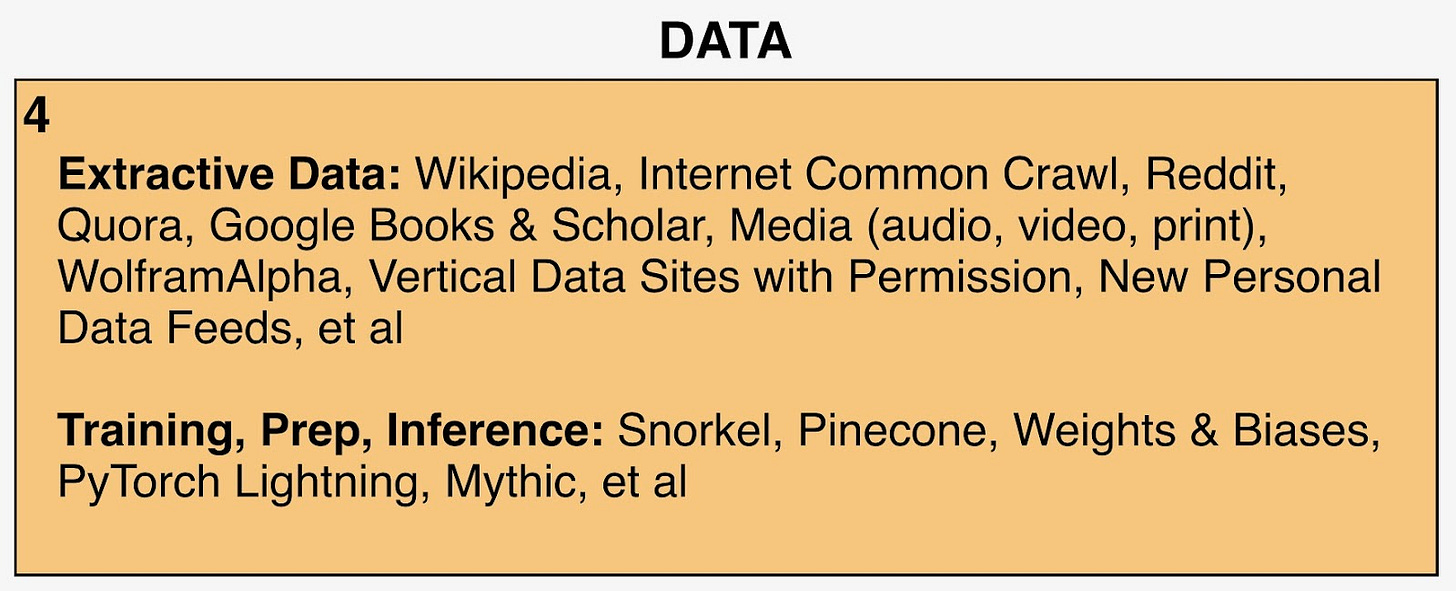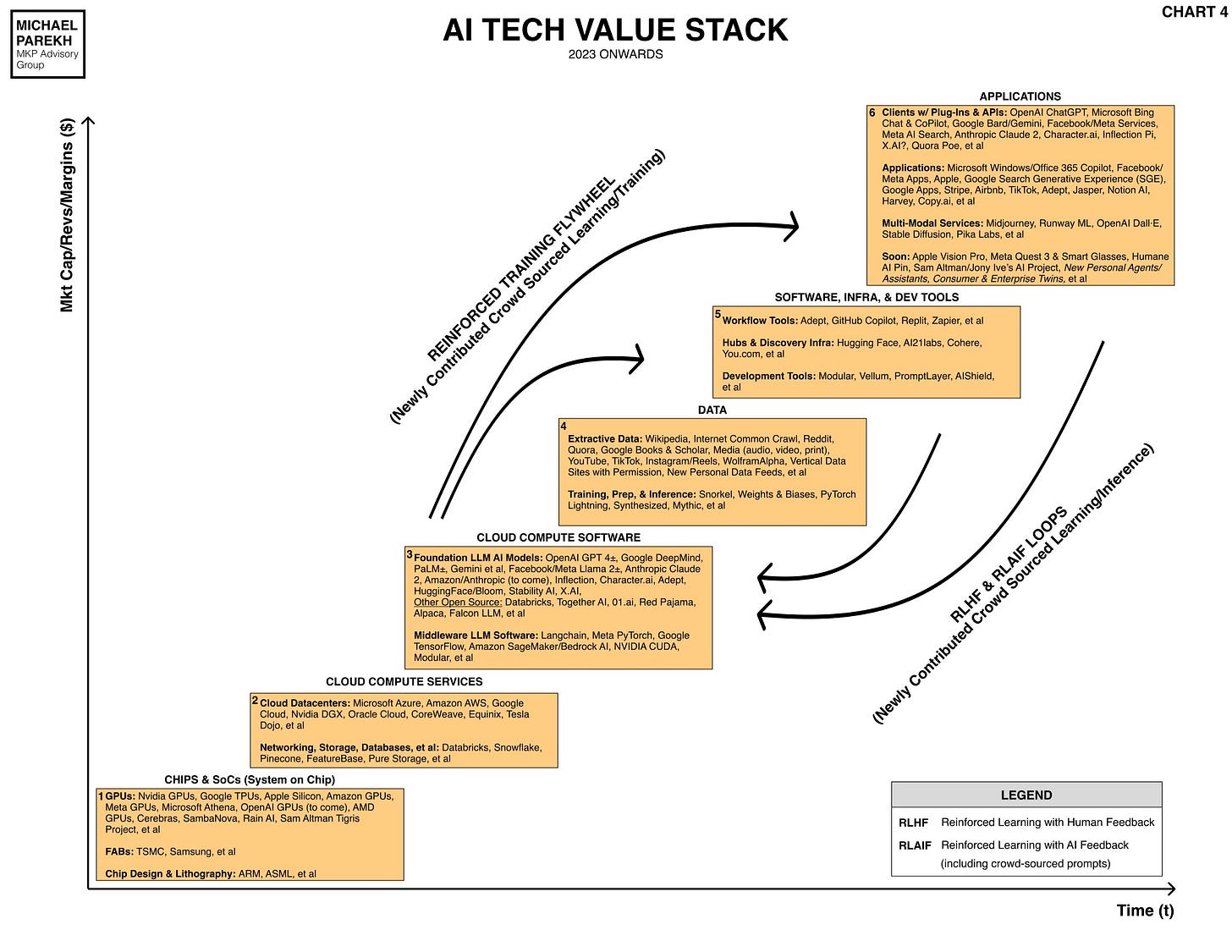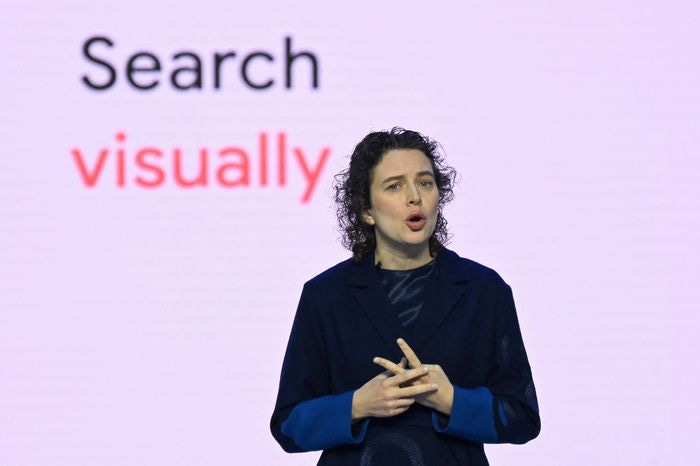Google is at the center again of how AI enabled Search will change the business models for news and other content providers on the internet. The ‘Content cards’ on the internet are being reshuffed again,
Of course as I’ve discussed before, this time we’ve also got the ongoing tussles and negotiations over ‘Extractive Data’ that fuels the AI Tech Wave, not just the traffic that Search has brought and taken away from new and content sites over the last twenty five years.
It’s the critical Box no. 4 in the AI Tech Wave stack, bolstered constantly along with Boxes 3 to 6, by the uniquely capable AI probabilistic math, AND the most useful ‘reinforcement learning’ loops I’ve long discussed in these pages over 200 plus posts:
The WSJ explores this topic in depth in “New Publishers See Google’s AI Search Tool as a Traffic-Destroying Nightmare”:
“Tech giant’s AI-powered search product is being tested on roughly 10 million users; publishers who rely on Google for traffic see gathering storm.”
“Shortly after the launch of ChatGPT, the Atlantic drew up a list of the greatest threats to the 166-year-old publication from generative artificial intelligence. At the top: Google’s embrace of the technology.”
“About 40% of the magazine’s web traffic comes from Google searches, which turn up links that users click on. A task force at the Atlantic modeled what could happen if Google integrated AI into search. It found that 75% of the time, the AI-powered search would likely provide a full answer to a user’s query and the Atlantic’s site would miss out on traffic it otherwise would have gotten.”
“What was once a hypothetical threat is now a very real one. Since May, Google has been testing an AI product dubbed “Search Generative Experience” on a group of roughly 10 million users, and has been vocal about its intention to bring it into the heart of its core search engine.”
“Google’s integration of AI is crystallizing for media outlets the perils of relying on big technology companies to get their content in front of readers and viewers. Already, publishers are reeling from a major decline in traffic sourced from social-media sites, as both Meta and X, the former Twitter, have pulled away from distributing news.”
“As bad as the social-media downshift is, Google’s generative-AI-powered search is the true nightmare for publishers. Across the media world, Google generates nearly 40% of publishers’ traffic, accounting for the largest share of their “referrals,” according to a Wall Street Journal analysis of data from measurement firm SimilarWeb.”
The core battle since the dawn of the internet is that technology has taken what was scarce (news and content), and made it infinitely abundant. We’ve gone from a handful of TV networks, newspapers, magazines and radio stations, to an infinitie, wonderful cacophony of content available not from ‘established’ publishers to the ‘unwashed masses’.
Those we call members of the quarter of a trillion dollar and growing ‘Creator Economy’. The ones who are driving Google YouTube, Bytedance TikTok, and Meta’s Instagram/WhatsApp and so many other online platforms to the new gatekeepers of the half a trillion dollar ‘Creator Econoy estimated by Goldman Sachs by 2025. The ‘Tyranny of Choice’ confronting us all as we go from scarcity to abundance.
And of course the eventual AI impact on the multi-billion dollar ‘Search Engine Optimized’ (SEO) global content business birthed by the evolution of Google in our lives (over ten billion searches a day by five plus billion soulds onine), that now is re-figuring out the future with AI over the horizon.
As the WSJ crystallizes in their piece, while Google deploys their next gen Foundation LLM AI models Gemini and others into their global Search business, the business models are going to be reshuffled again. And this is of course before the ChatGPT catalyzed horse race between Google and OpenAI/Microsoft, the world is transfixed watching.
The short term crux of the battle going into 2024 of course is the ‘Fair Use’ question on the ‘Extractive Data Content’ that drives the Data pumps making Foundation LLM AI work in the first pace:
“While Google says the final shape of its AI product is far from set, publishers have seen enough to estimate that they will lose between 20% and 40% of their Google-generated traffic if anything resembling recent iterations rolls out widely. Google has said it is giving priority to sending traffic to publishers.”
“The rise of AI is the latest and most anxiety-inducing chapter in the long, uneasy marriage between Google and publishers, which have been bound to each other through a basic transaction: Google helps publishers be found by readers, and publishers give Google information—millions of pages of web content—to make its search engine useful.”
Especially as Foundation LLM AI models go ‘multimodal’, incorporating voice, pictures and videos beyond just text prompts and queries:
“Google’s embrace of AI in search threatens to throw off that delicate equilibrium, publishing executives say, by dramatically increasing the risk that users’ searches won’t result in them clicking on links that take them to publishers’ sites. Most gallingly for publishers, Google’s AI search was trained, in part, on their content and other material from across the web—without payment.”
“Google’s view is that anything available on the open internet is fair game for training AI models. The company cites a legal doctrine that allows portions of a copyrighted work to be used without permission for cases such as criticism, news reporting or research.”
“The new search features are also a balancing act for Google, which has moved quickly to refashion its flagship product in response to the rising popularity of chatbots like ChatGPT. The changes risk damaging website owners that produce the written material vital to both Google’s search engine and its powerful AI models.”
The backdoor discussions between AI driven companies and publishers are ‘conciliatory’ for now, as the outlines for the negotiations are understood and discussed:
“Barry Diller, chairman of IAC and Expedia, said all major AI companies, including Google and rivals like OpenAI, have promised that they would continue to send traffic to publishers’ sites. “How they do it, they’ve been very clear to us and others, they don’t really know,” he said.
“Many of IAC’s properties, like Brides, Investopedia and the Spruce, get more than 80% of their traffic from Google, according to SimilarWeb.”
“IAC senior executives met with Google senior executives at the Allen & Company conference in Sun Valley, Idaho, in July to discuss AI. Google told publishers at the meeting that it can’t directly trace the sources behind the outputs of AI systems, despite recent technological advances, said people familiar with the discussions.”
“It’s all conciliatory at the moment,” Diller said of the tone that Google and other tech companies have taken in meetings with publishers over AI.”
Google and tech companies will of course offer additional Ai tech tools for publishers to drive more positive change in their business modes:
“Google’s Reid said AI is the future of search and expects its new tool to result in more queries.
“The number of information needs in the world is not a fixed number,” she said. “It actually grows as information becomes more accessible, becomes easier, becomes more powerful in understanding it.” Testing has suggested that AI isn’t the right tool for answering every query, she said.
Some publishers are focusing on the legal question of whether Google or any AI company has the right to scrape their content without permission. Diller said he believes publishers’ copyrights are being violated. “We believe that can be relatively easily and fairly quickly corrected,” he said.”
In the end, the issue is that these new AI driven algorithms will further change the business models for content publishers, diminishing their negotiating positions no different from workers in the ‘gig economy’. The Uber drivers, the Doordash delivery folks, and millions more, who are forced to manage their daily businesses to suit the perceived whims of the software algorithms that tells them where to go work, and how much they get paid.
And all of this is BEFORE the expected deluge of AI native generated news and other content ahead that is created from real and synthetic data. It’s the challenge or businesses in industries across the spectrum, as we go from scarcity to abundance. The ‘Content and Data cards’ are being reshuffled indeed. Stay tuned.
(NOTE: The discussions here are for information purposes only, and not meant as investment advice at any time. Thanks for joining us here)








